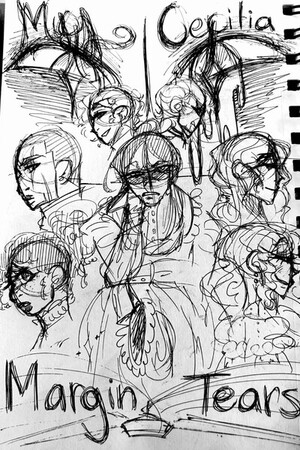Chapter 32:
nA Abtoseul Blal
Margin Tears: My Cecilia
…
…
The air shifted. The chandeliers gleamed brighter this time. Too bright. Their crystal arms bent downward, forcing the light into my eyes until she had no choice but to blink tears away. The ballroom hush fell not from scandalous laughter and spilled champagne but from command—silence pressed over every throat like a hand.
The violins had returned. And this time, they did not falter.
Cecilia tried to step back into the crowd, to make myself small, but the guests’ bodies shifted like scenery on tracks, sliding away, leaving her in the beam of cruel spotlight once again. Her tray of champagne was gone. Her apron was gone. She stood instead in some pale gown stitched from sentences, its silk sticking to her skin like spiderweb.
“No,” she whispered. Her voice was too thin, stolen before it reached anyone else’s ear.
Across the marble floor, the lord turned, cloak settling perfectly upon his shoulders. His eyes burned—not with confusion, not with whipped cream humiliation, but with polished inevitability.
“Dance with me,” he said. The same words, but this time there was no laughter left in her throat to deflect them. The syllables curled around her body like chains, tugging her forward.
She stumbled a step. Her feet were no longer hers—they were written, her steps predetermined.
You ruined me once, the air around her hummed, the voice of the narrator bleeding through chandeliers, violins, even the pounding in her chest. “But you cannot ruin me twice; I will not allow it. You will play the scene correctly.”
“No,” she said again, but it was a child’s denial, weak against the tide of narrative force. Her hands lifted as though strings pulled them. His glove slid against her palm, warm, unyielding.
They began to move.
She wanted to misstep, to trip and topple into the canapé table again, but her feet glided with unnatural grace. Every motion perfectly rehearsed, as if her bones remembered choreography she had never learned. Her protests drowned under the violins, which no longer played music but commands, measure by measure.
See how easily it is done? whispered the narrator, brushing each word against her ear like mockery. A sway, a spin, a gaze. That is all you were ever made for, all you were ever meant to be.
She spun beneath the lord’s arm, skirts flaring. He drew her close—Too, too close. Her head tipped back on a hinge, and her lips parted, not from choice but from a line she did not speak.
The ballroom swayed. The guests blurred, their faces blank, their clapping silent. The world narrowed until there was only the lord, the music, and her—an unwilling marionette in a story too determined to be denied.
For one sharp second, she caught herself in a mirror at the far wall. Not herself—a stranger, a filler, a prize, a guest. She was nothing but a collection of traits, all trembling shoulders and stiff limbs, unsure and unpronounced.
Faceless.
She did not recognize the reflection, but she felt the itch of something alien just underneath the thin barrier of skin.
The lord, the narrator, the two powers within one body, laughed softly, through the bowing of strings, through the grinding of chandeliers.
“This is how it was always meant to be.”




Please sign in to leave a comment.